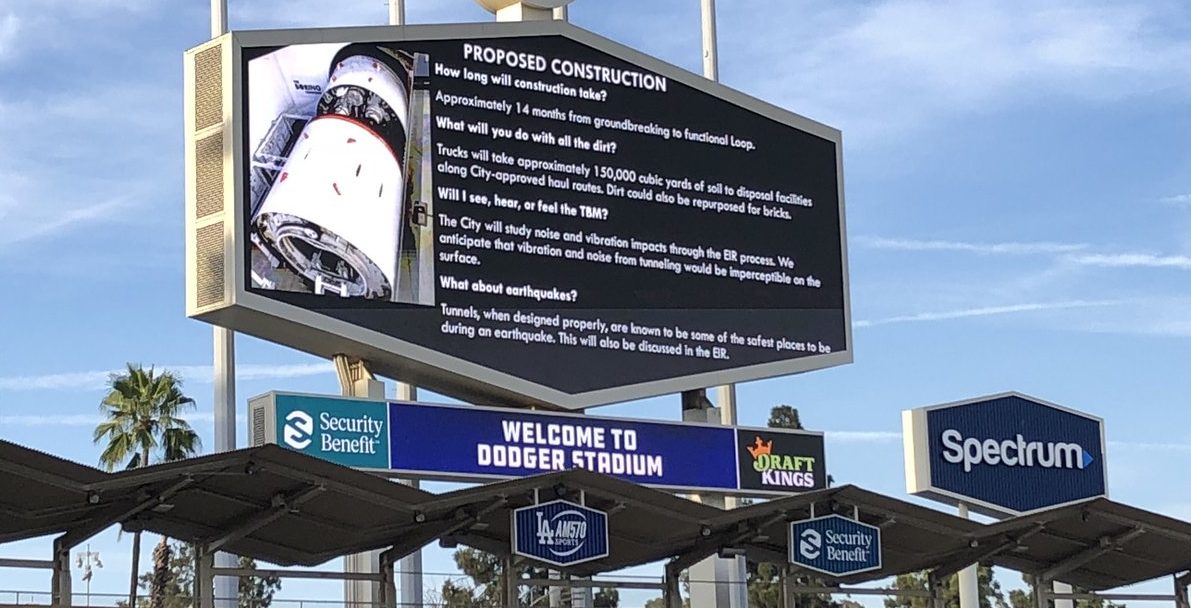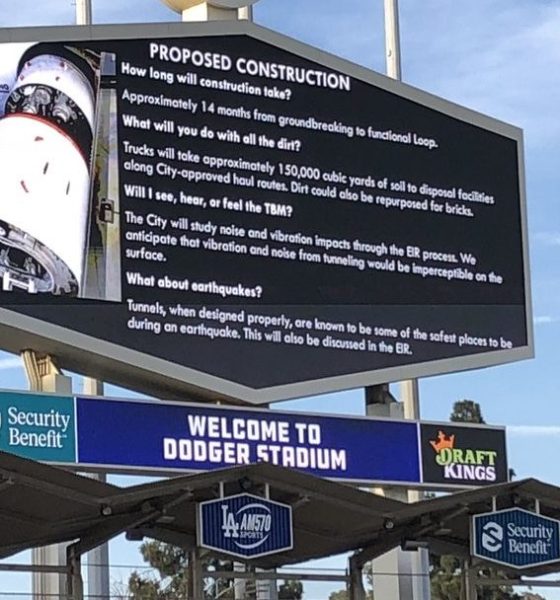

News
Elon Musk accused of astroturfing after SpaceX employees expressed support for Boring Co. project
In a rather bizarre turn of events, Elon Musk is now being accused of astroturfing after three SpaceX employees spoke in favor of The Boring Company’s proposed Dugout Loop project for Los Angeles. The Boring Company held its public review at the Dodgers Stadium yesterday, where it presented the concept of its high-speed tunnel system to residents in the area. Only around 50 people attended the event, and a handful opted to express their support for the project.
Independent filmmaker Erin Faulk, who goes by the @erinscafe handle on Twitter, attended The Boring Company’s public hearing. In a series of Twitter posts, Faulk pointed out the public hearing’s weak turnout, while also expressing her doubts about the proposed tunnel system. Faulk summarized her thoughts about the project in a statement to CNET.
“I thought it sounded kind of silly before, but now I’m convinced it’s ridiculous. The desperate attempts to show how it’s going to help people in Los Angeles are kind of transparent. It has such a narrow scope and use,” she said.
The independent filmmaker also discovered that several individuals who spoke in favor of the Boring Company’s proposed Dugout Loop were actually employees of SpaceX. Among these were Hailey Cockrum, a Materials Planner, and Chris Charhut, a Process Development Engineer. This connection with Elon Musk instantly incited controversy among members of the Twitterverse, some of whom accused Musk of astroturfing (compensating a group of individuals to give the impression that a project, idea, or person is enjoying widespread support) the public hearing. Being the controversy magnet that Musk’s name has unfortunately become as of late, it is somewhat unsurprising to see accusations of astroturfing being thrown his way.
“As Elon describes, traffic here is soul-crushing.”
There is no way Elon didn’t pay these people wtf is happening. pic.twitter.com/qBB4xJwzCn
— Scafe says wear a gd mask (@erinscafe) August 29, 2018
IS THIS REAL LIFE pic.twitter.com/TC11INnFEO
— Scafe says wear a gd mask (@erinscafe) August 29, 2018
While it is true that SpaceX employees did speak on the Boring Company’s public hearing, there is one little problem with the astroturfing accusation. The SpaceX employees who showed up and spoke at the event were LA residents. Thus, they were at Dodgers Stadium as private citizens and had every right to air their support for the Dugout Loop. The Boring Company provided a statement about the event through its official Twitter account, poking a little fun at the astroturfing accusation.
SpaceX employees spoke – not with our knowledge or at our urging – to offer support as private citizens. We‘d have asked them to identify themselves to avoid confusion if we had known. SpaceX has 5k employees in LA – if the goal was to astroturf, we’d have done a much better job!
— The Boring Company (@boringcompany) August 29, 2018
The Dugout Loop and the Boring company might be getting mocked and bashed on social media after its recent public review, but the proposed project is actually getting some support from LA Mayor Eric Garcetti, who described the project as a “great example of public-private partnership.” Dodgers CFO Tucker Kain also aired his support for the project, stating that the team is entirely behind initiatives that would ultimately make it easier for baseball fans to get to a game.
The proposed Dugout Loop will begin at the Dodger Stadium property and run under Vin Scully Avenue and Sunset Boulevard, with starting points being set up at either Vermont/Sunset, Vermont/Santa Monica or Vermont/Beverly. The Boring Company aims to utilize the Dugout Loop as a support for the city’s Metro Red Line stations.
The tunneling startup would be using its Loop transport concept for the LA tunnel system. The Loop system uses electric pods which are designed to carry up to 16 people at a time. The Boring Company expects to charge $1 per person for every ride in the Loop system. Construction for the Dugout Loop is estimated to take about 14 months to complete. The project is also 100% privately funded, and thus, will be built at no expense to the city’s residents.
The Dugout Loop is, if any, a prototype project that just happens to have public utility as a pleasant side effect. The tunnel, after all, is just one of the Boring Company’s projects across the United States. In Chicago alone, the company is involved in a high-profile project that would see the tunneling startup attempt to develop a high-speed transport system connecting downtown Chicago to O’Hare airport.
The Los Angeles Bureau of Engineering (LABOE) posted a document covering some of the finer details of Boring Company’s proposed Dugout Loop project, which could be accessed here.

Cybertruck
Tesla drops latest hint that new Cybertruck trim is selling like hotcakes
According to Tesla’s Online Design Studio, the new All-Wheel-Drive Cybertruck will now be delivered in April 2027. Earlier orders are still slated for early this Summer, but orders from here on forward are now officially pushed into next year:

Tesla’s new Cybertruck offering has had its delivery date pushed back once again. This is now the second time, and deliveries for the newest orders are now pushed well into 2027.
According to Tesla’s Online Design Studio, the new All-Wheel-Drive Cybertruck will now be delivered in April 2027. Earlier orders are still slated for early this Summer, but orders from here on forward are now officially pushed into next year:
🚨 Tesla has updated the $59,990 Cybertruck Dual Motor AWD’s estimated delivery date to April 2027.
First deliveries are still slated for June, but if you order it now, you’ll be waiting over a year.
Demand appears to be off the charts for the new Cybertruck and consumers are… pic.twitter.com/raDCCeC0zP
— TESLARATI (@Teslarati) February 26, 2026
Just three days ago, the initial delivery date of June 2026 was pushed back to early Fall, and now, that date has officially moved to April 2027.
The fact that Tesla has had to push back deliveries once again proves one of two things: either Tesla has slow production plans for the new Cybertruck trim, or demand is off the charts.
Judging by how Tesla is already planning to raise the price based on demand in just a few days, it seems like the company knows it is giving a tremendous deal on this spec of Cybertruck, and units are moving quickly.
That points more toward demand and not necessarily to slower production plans, but it is not confirmed.
Tesla Cybertruck’s newest trim will undergo massive change in ten days, Musk says
Tesla is set to hike the price on March 1, so tomorrow will be the final day to grab the new Cybertruck trim for just $59,990.
It features:
- Dual Motor AWD w/ est. 325 mi of range
- Powered tonneau cover
- Bed outlets (2x 120V + 1x 240V) & Powershare capability
- Coil springs w/ adaptive damping
- Heated first-row seats w/ textile material that is easy to clean
- Steer-by-wire & Four Wheel Steering
- 6’ x 4’ composite bed
- Towing capacity of up to 7,500 lbs
- Powered frunk
Interestingly, the price offering is fairly close to what Tesla unveiled back in late 2019.
Elon Musk
Elon Musk outlines plan for first Starship tower catch attempt
Musk confirmed that Starship V3 Ship 1 (SN1) is headed for ground tests and expressed strong confidence in the updated vehicle design.

Elon Musk has clarified when SpaceX will first attempt to catch Starship’s upper stage with its launch tower. The CEO’s update provides the clearest teaser yet for the spacecraft’s recovery roadmap.
Musk shared the details in recent posts on X. In his initial post, Musk confirmed that Starship V3 Ship 1 (SN1) is headed for ground tests and expressed strong confidence in the updated vehicle design.
“Starship V3 SN1 headed for ground tests. I am highly confident that the V3 design will achieve full reusability,” Musk wrote.
In a follow-up post, Musk addressed when SpaceX would attempt to catch the upper stage using the launch tower’s robotic arms.
“Should note that SpaceX will only try to catch the ship with the tower after two perfect soft landings in the ocean. The risk of the ship breaking up over land needs to be very low,” Musk clarified.
His remarks suggest that SpaceX is deliberately reducing risk before attempting a tower catch of Starship’s upper stage. Such a milestone would mark a major step towards the full reuse of the Starship system.
SpaceX is currently targeting the first Starship V3 flight of 2026 this coming March. The spacecraft’s V3 iteration is widely viewed as a key milestone in SpaceX’s long-term strategy to make Starship fully reusable.
Starship V3 features a number of key upgrades over its previous iterations. The vehicle is equipped with SpaceX’s Raptor V3 engines, which are designed to deliver significantly higher thrust than earlier versions while reducing cost and weight.
The V3 design is also expected to be optimized for manufacturability, a critical step if SpaceX intends to scale the spacecraft’s production toward frequent launches for Starlink, lunar missions, and eventually Mars.
News
Tesla FSD (Supervised) could be approved in the Netherlands next month: Musk
Musk shared the update during a recent interview at Giga Berlin.

Tesla CEO Elon Musk shared that Full Self-Driving (FSD) could receive regulatory approval in the Netherlands as soon as March 20, potentially marking a major step forward for Tesla’s advanced driver-assistance rollout in Europe.
Musk shared the update during a recent interview at Giga Berlin, noting that the date was provided by local authorities.
“Tesla has the most advanced real-world AI, and hopefully, it will be approved soon in Europe. We’re told by the authorities that March 20th, it’ll be approved in the Netherlands,’ what I was told,” Musk stated.
“Hopefully, that date remains the same. But I think people in Europe are going to be pretty blown away by how good the Tesla car AI is in being able to drive.”
Tesla’s FSD system relies on vision-based neural networks trained on real-world driving data, allowing vehicles to navigate using cameras and AI rather than traditional sensor-heavy solutions.
The performance of FSD Supervised has so far been impressive. As per Tesla’s safety report, Full Self-Driving Supervised has already traveled 8.3 billion miles. So far, vehicles operating with FSD Supervised engaged recorded one major collision every 5,300,676 miles.
In comparison, Teslas driven manually with Active Safety systems recorded one major collision every 2,175,763 miles, while Teslas driven manually without Active Safety recorded one major collision every 855,132 miles. The U.S. average during the same period was one major collision every 660,164 miles.
If approval is granted on March 20, the Netherlands could become the first European market to greenlight Tesla’s latest supervised FSD (Supervised) software under updated regulatory frameworks. Tesla has been working to secure expanded FSD access across Europe, where regulatory standards differ significantly from those in the United States. Approval in the Netherlands would likely serve as a foundation for broader EU adoption, though additional country-level clearances may still be required.








